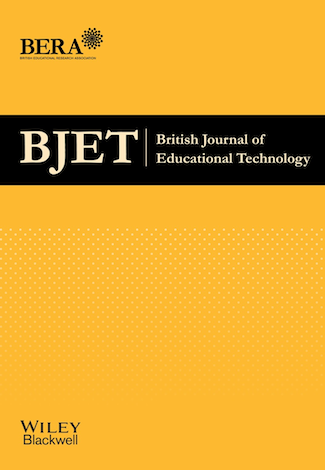An issue of British Journal of Educational Technology has just been added to EdITLib.
The table of contents is available here: http://www.editlib.org/j/BJET/v/46/n/4//
Contents
Chih‐Yueh Chou & Pin‐Hsun Lin
Peer instruction (PI) involves students answering questions and peer discussion learning activities. PI can enhance student performance and engagement in classroom instruction. However, some students do not engage in the …
More Ibrahim Arpaci
The objective of this paper is to understand the impact of cultural differences on mobile learning adoption through identifying key adoption characteristics in Canada and Turkey, which have markedly different …
More Sharon E. Booth & Shaun B. Kellogg
The popularity and pervasiveness of online communities have led researchers and practitioners alike to closely examine the utility of online communities for supporting and facilitating professional learning. As economic constraints …
More Kwok‐Wing Lai & Kian‐Sam Hong
As digital technologies form an inextricable part of young people's everyday lives, some commentators claim that the current generation of learners think and learn differently from their predecessors. This study …
More Min Jou & Jingying Wang
This study investigated a Ubiquitous Sensor System (USS) that we developed to assess student thought process during practical lessons on a real-time basis and to provide students with a reflective …
More Nora Mogey & Andrew Fluck
It seems anachronistic that we expect students to handwrite essay examinations when almost all their other work is mediated by computer. Two universities, one in the UK and one in …
More Halszka Jarodzka, Noortje Janssen, Paul A. Kirschner & Gijsbert Erkens
This study investigated whether design guidelines for computer-based learning can be applied to computer-based testing (CBT). Twenty-two students completed a CBT exam with half of the questions presented in a …
More Ali Tarhini, Kate Hone & Xiaohui Liu
This paper examines the social, organisational and individual factors that may affect students' acceptance of e-learning systems in higher education in a cross-cultural context. A questionnaire was developed based on …
More Yueh‐Min Huang & Tsung‐Ho Liang
Tracking individual reading behaviors is a difficult task, as is carrying out real-time recording and analysis throughout the reading process, but these aims are worth pursuing. In this study, the …
More Ebrahim Rahimi, Jan Berg van den & Wim Veen
In recent educational literature, it has been observed that improving student's control has the potential of increasing his or her feeling of ownership, personal agency and activeness as means to …
More Yi‐Chun Hong & Ikseon Choi
Reflection is a critical factor in solving design problems. Using good methods to observe designers' reflection is essential to inform the design of the learning environments that support the development …
More Darren Cooper & Steve Higgins
The use of instructional videos to teach clinical skills is an ever growing area of e-learning based upon observational learning that is cited as one of the most basic yet …
More Elaine Garcia, Ibrahim Elbeltagi, Mel Brown & Kerry Dungay
While the use of Web 2.0 tools and specifically blogs is becoming increasingly popular within higher education (HE) and has been shown to promote learning, relatively little is known about …
More Chad C. Tossell, Philip Kortum, Clayton Shepard, Ahmad Rahmati & Lin Zhong
Smartphone technology is penetrating world markets and becoming ubiquitous in most college settings. This study takes a naturalistic approach to explore the use of these devices to support student learning. …
More Insung Jung & Yoko Suzuki
Wikis can be used to encourage and support collaborative constructivist learning. However, their effectiveness depends upon the use of scaffolding strategies to guide the students in their use. This action …
More

